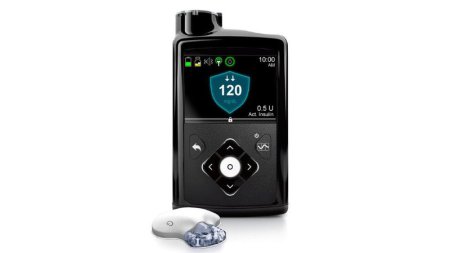
What’s Trending Now: The Food and Drug Administration has approved a new insulin delivery system for people with Type 1 diabetes.
The device, Medtronic’s MiniMed 670G hybrid closed loop system, is made up of an insulin pump and continuous glucose monitor (CGM), both of which are already on the market separately. The new part involves the communication between the two devices.
Medtronic’s previous system already had a feature that would shut down the insulin pump if the wearer’s blood sugar dropped too low. But the 670G predicts when a person’s blood sugar is dropping and prevents the low in the first place, and also corrects high blood sugars.
This is the first such machine in the world with that level of automation, and thus it is informally being called the first “artificial pancreas” system.
However, it’s called a hybrid rather than a fully closed-loop system because users will still need to signal that they’re about to eat and estimate the carbohydrate count of the food so the device can calculate the additional amount of insulin needed.
For people with Type 1 diabetes, the new capabilities mean they can both sleep through the night without worrying about their blood sugars dropping too low and can go through their day without having to think about their diabetes all the time,
“You get almost normalized overnight blood glucose. For people with Type 1 diabetes, that’s massively important,” according to Aaron Kowalski, chief mission officer for the JDRF, the organization that funds much of the “artificial pancreas” research. “The diabetes isn’t gone, but [wearers] can think about it less …This is a historic milestone.”

LISTEN NOW: Diabetes Late Nite hosted by Mr. Divabetic. We’re talking about kidney disease and diabetes on our 6th Anniversary Diabetes Late Nite podcast with musical inspiration from P.M. Dawn. Guests: Poet Lorraine Brooks, Mama Rose Marie, the Charlie’s Angels of Outreach, Lynette Luckers from the Marion Luckers Kidney Foundation, Chef Robert Lewis aka ‘The Happy Diabetic’, Janis Roszler, RD, CDE, FAND and Leon Petrossian.
















 Join us for Divabetic’s “Family Affair” free diabetes outreach scheduled for Saturday, may 14, 11 AM – 3 PM at Thomas Jefferson University Hospital.
Join us for Divabetic’s “Family Affair” free diabetes outreach scheduled for Saturday, may 14, 11 AM – 3 PM at Thomas Jefferson University Hospital.

